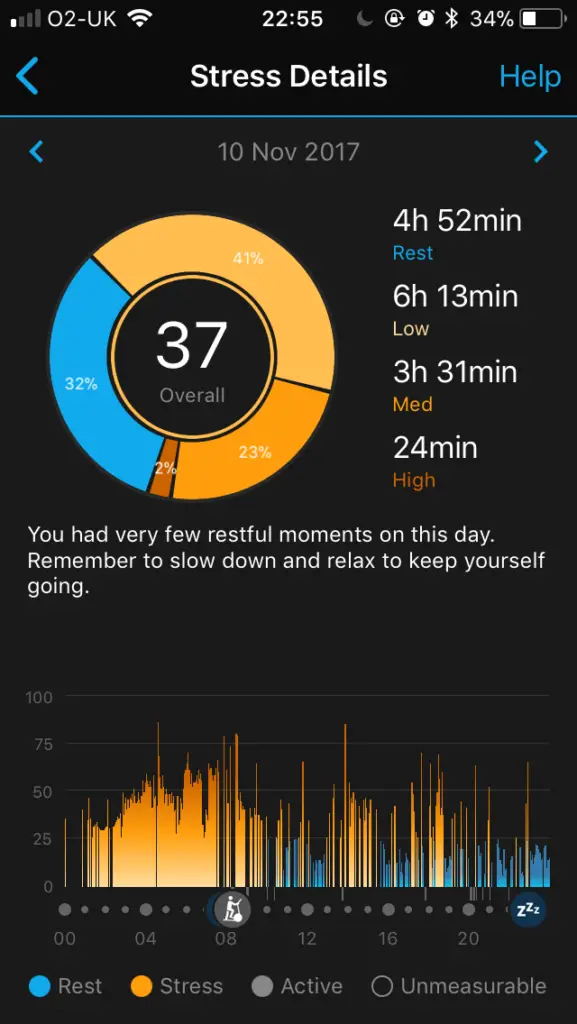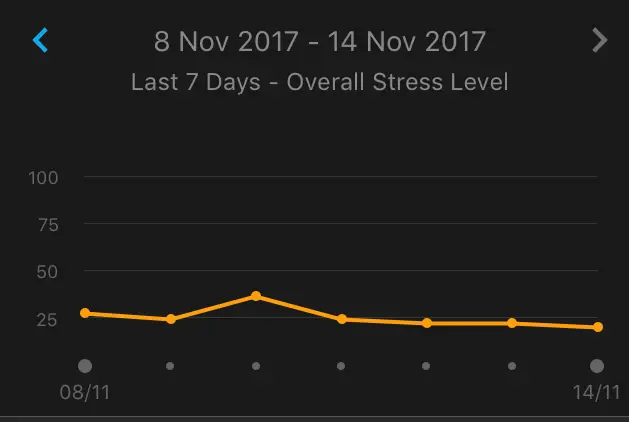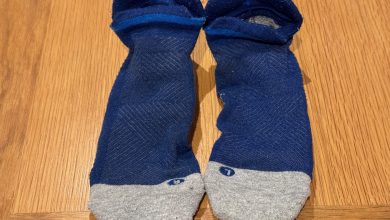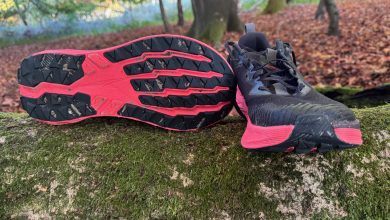Six things I’ve learned after more than a month of wearing the Garmin Vivoactive 3
I’ve been wearing my Garmin Vivoactive 3 (which we rate as one of the best hiking watches you can buy right now) for about six weeks now, and I thought I’d summarise a few things I’ve learnt that have taken a bit of time to figure out, and therefore weren’t covered in the initial review. Some are things I’ve learnt about the device, like how Garmin measures stress – others are things I’ve learnt about myself, like how alcohol makes me stressed…!
1. My stress levels are a bit lower at the weekend.
This is probably the least surprising learning on the whole list, but it’s interesting to note that the Garmin’s ‘stress’ detection is at least accurate enough to differentiate between a working day and a weekend.
However…
2. They are much lower when sleeping in my own bed. In fact, a good night’s sleep has the biggest impact on average stress that day.
This is actually far more noticeable than the weekend thing. I spend a lot of time away from home at the moment, and my average stress levels are far lower when I’m sleeping in my own bed (which is extremely comfortable, the right temperature, and in a quiet room) rather than in an airbnb which may have a fairly uncomfortable bed in a noisy room that is often too cold or too hot.
The thing is (and I think this is perhaps somewhat a flaw, from a certain point of view) the Vivoactive measures ‘stress’ levels while you’re asleep which, don’t get me wrong, is both valid and interesting (as the next point will show, since there is a considerable difference between an un-stressed sleep and a stressed sleep. However, the problem is that since you spend roughly 1/3rd of the day asleep, this has a massive impact on your average stress level for the day, and therefore slightly distorts the figure that you are probably more interested in, which is how stressed were my waking hours. I’d prefer to have the sleep-based stress level kept out of stress as a whole and incorporated into the sleep views, which are in fact not nearly detailed enough about quality of sleep as opposed to quantity.
Anyway, the point is that a really good night’s sleep in a comfortable bed can compensate for a pretty awful day at work, which I suppose is a good insight. Whereas…
3. I sleep really badly when I’m drunk – and that’s part of the problem.

As you can see from the graph above, it’s really noticeable how ‘stressed’ my sleep is when I go to bed drunk. We all know that, no matter if we fall into a deep drunken sleep for ten hours, we’ll probably wake up feel wretched and be tired all day after a big night, and this partly demonstrates why. I may get eight, nine or even ten hours sleep after a heavy night, but the quality of sleep is awful. I’ve actually found having this presented to me so clearly a little sobering (if you’ll excuse the pun) and it’s definitely made me think twice about how often and how much I drink during the week.
4. The ‘move’ notification is a bit pointless
Maybe this is just me, but I don’t find the prompt to ‘move’ every hour very useful. The problem is that it takes a lot of movement to clear it – like a 3-4 minute walk, something that is hard to achieve in the office. If I could clear it by getting up and walking to the kitchen, or something, then I would. However I’ve realised I can’t, so I now tend to just ignore it, and let it clear itself a few times a day when I would be walking anyway – out to lunch, or to the train at the end of the day. The result is that it becomes completely pointless. I think one (or both) of the following two changes are needed:
– Make it easier to clear the notification. Getting up every hour and walking to the kitchen would be beneficial, so I feel I should be encouraged to do so, whereas since this isn’t good enough for my Garmin, there’s no motivation to bother.
– Track how much time I spend each day with an ‘uncleared’ move bar. This would be interesting and would motivate me more to try to clear it regularly, even if I didn’t quite manage to do so every hour as the Garmin would like.
5. Both my Garmin stress score and heart rate are far higher when I’m hungover

Yes, a lot of my learnings relate to alcohol. But hey, wearing a watch like this is all about the healthy lifestyle choices. And yes, it’s very noticeable not only how ‘unhealthy’ I feel with a hangover, but how objectively unwell I actually am according to the Garmin stress score. Again, it’s another motivation not to drink so much, when the data is presented so coldly – after all, a resting HR some 10-15bpm higher than normal is pretty striking.
Although I didn’t screenshot the graph, I noticed similar stats for a 48hr period when I was extremely unwell with D&V. What I haven’t yet (fortunately) had, is the kind of slow-onset and slow-recovery illness where having these sort of metrics might be useful for making educated decisions about when to stop training and when to start again.
6. You need to plan when you charge it.
The vivoactive is at it’s best when you wear it all the time, but of course it still needs to be charged, at least once a week and potentially more frequently if you use it a lot for workouts. Fortunately it charges incredibly quickly – usually from close to 0% up to 100% in under an hour – but you still have to think about when to stick it on charge. Doing it overnight seems obvious but is a waste of all that lovely lovely sleep data, so I tend to put it on charge when I’m in the shower, when I don’t like wearing it (though it is waterproof of course – you can swim in it), and occasionally for an hour when sitting around the flat if it needs more charge. I tend to feel that the loss of that kind of data is pretty irrelevant. That said, I’m often showering after a workout, of course, and so tracking my recovery HR might be useful… but no system is perfect. It’s just something you’ll need to consider.
Garmin Stress Score Q&A
A lot of the points above revolve around the enigmatic ‘stress score’ that the Garmin provides. This metric raises some really interesting questions, which I’ve tried to answer below:
What is the Garmin stress score?
The stress score is based on your heart-rate, but it’s important to understand that it’s not simply a case of whether your HR is high or low, since that has more to do with how much exercise you are doing than your stress level. Instead, stress score is based on heart-rate variability (HRV). This is a really interesting measure which is based on the variance in interval between heart beats.
You see, if your heart is beating at 60bpm you might assume that it is beating exactly once per second, but in reality there will be variance – sometimes it might beat every 0.9 seconds, sometimes ever 1.1 seconds, and so on.
You might think that an inconsistent heart-beat is a bad thing but infact higher HRV is a good thing. To understand that, you have to understand that your heartbeat is essentially controlled by two different parts of the nervous system: the parasympathetic which reacts to core body functions like organs, and the sympathetic which reacts to external inputs like exercise or stressful events. The former will generally try to decrease your HR while the latter tries to increase it.
It is the tension between the two that causes heart-rate variability, and so having a higher HRV (up to a point) actually shows that the two sides of your nervous system are in balance. That means you are easily able to respond to any need to increase or decrease your heart rate and therefore your body is ‘ready to go’. If you become unwell, or if you are constantly subject to higher external stressors, one or other side is likely to take over and cause reduced HRV, which Garmin interprets as ‘stress’ and uses to increase your stress score.
How does Garmin measure stress?
Garmin first measures heart-rate variability, which it can do on the Vivoactive 3 and any other device with a wrist-based heart-rate monitor by simply detecting each heartbeat and keeping track of the precise periods between each one. It then uses its own algorithm, based partly on your age and fitness profile but also whether your heart rate was elevated due to exercise, for example, to turn that basic HRV measurement into a stress score from 1-100.
What does the score really tell you?
The best way to interpret your stress score is as a measure of how ready your body is to train. The lower your stress score, the more ready your heart is to respond to inputs, whereas when you have a higher stress score you may feel sluggish and struggle to exercise and the intensity you’re used to. This can be a great way to plan your training, to identify when you’re feeling run down and need to take a break or to see how ready you are to up the intensity again after a bout of illness, a heavy night, or a big event like a marathon.
What affects the score?
Aside from the effects of alcohol and hangovers, which I mentioned a lot above and will talk about more below, the stress score can be affected by a whole range of different lifestyle, physiological and training factors. Food, sleep and rest all have an impact as does psychological stress that might be caused by work or personal difficulties. Equally, short-term illness and longer-term health conditions can have an impact, as can age. And finally, the volume and intensity of your training can affect your stress score.
This means it can be difficult to identify particular causes behind any single day’s score, and I would shy away from assuming it is as simple as being down to psychological stress. However, once you have a good handle on what your ‘normal’ stress score is, it may be possible to identify how changes in some of the items above could have an impact, and that can help you better manage yourself and your wellbeing.
Why does alcohol affect the score?
Alcohol is just one of several factors that can affect HRV and therefore the Garmin stress score, but it’s especially noticeable because it has such a noticeable immediate impact that we can immediately tie to something we’ve done to ourselves.
The problem is multi-fold, unfortunately. First, alcohol is a form of poison that affects our organs; making our hearts, liver, stomach and so on all work harder. On top of that, you’re highly likely to get a much lower quality of sleep, which has a knock-on impact on the stress score. And finally, the psychological stress that many of us feel after a night of heavy drinking can also have an impact. A single big night can affect our HRV for up to a week, and this will have an impact on our ability to train at higher intensities. Hopefully, knowing this and seeing the figures laid out so clearly is a sobering (‘scuse pun) reminder of how bad alcohol can be for us, and the negative impact it has on a serious training schedule.
What is a good score?
There is not any such thing as a ‘good’ stress score. There are HRV averages based on age group but, because of the way Garmin calculates the stress score based on age, it’s difficult to back-interpolate HRV from the stress score so I would shy away from any kind of comparison with other people. Instead, use stress score purely to assess yourself – don’t worry about the individual numbers too much, instead concern yourself with what seems to increase or decrease it, and identify trends in your scores that may show when you are over-training, unwell, over-stressed at work, or conversely when you are at your most fit and ready for a big event.
Why is your Garmin stress score high during sleep?
Because the stress score is based on heart-rate variability, and not on simple heart-rate, it is perfectly possible to have a low HRV (and therefore a high stress score) despite your HR being quite low because you are at rest or even asleep. The reasons why your stress score would be higher while you are sleep are, in many cases, the same as why it could be high while you’re awake – being unwell, being poorly rested, being under the influence of alcohol, having over-trained, or having had a stressful day at work. It’s true that many of these factors are reduced at night and you would hope that your stress score does decrease a bit at night, but it’s also true that if your body is unwell or affected by alcohol, that’s not necessarily going to change just because you’re asleep – and the stress score does a good (and somewhat worrying, sometimes!) job of highlighting that.




